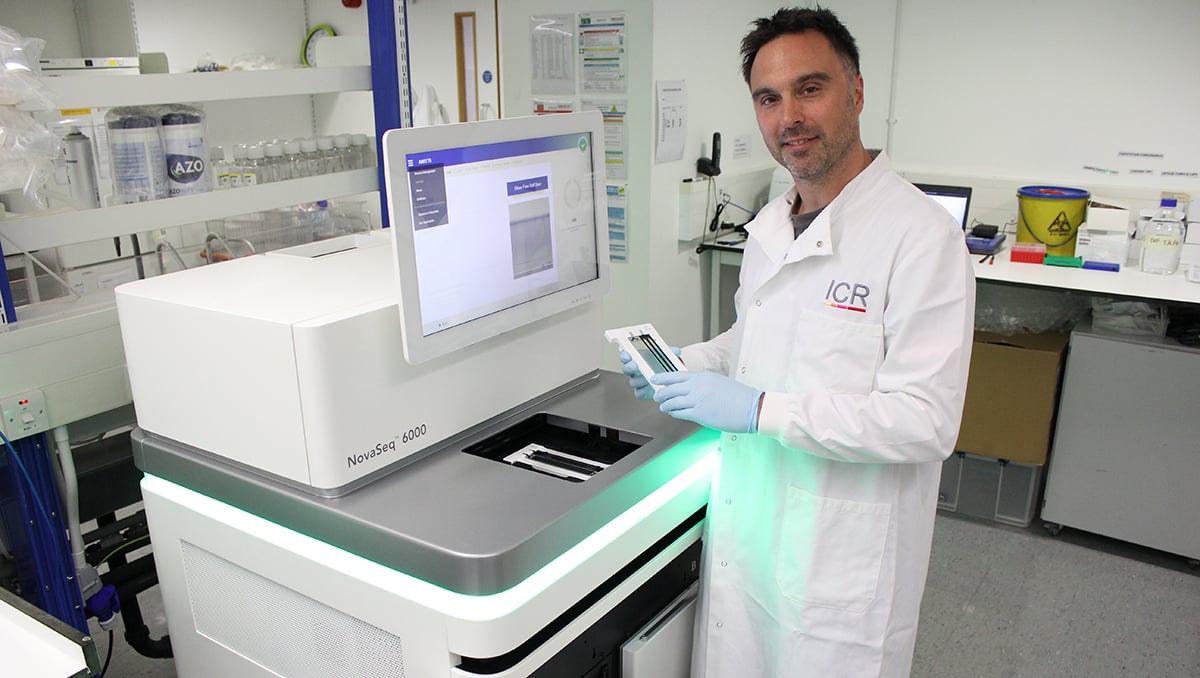
Image: Nik Matthews, Genomics Manager in the ICR's Tumour Profiling Unit with the NovaSeq sequencer.
UK scientists now have access to a new kind of next-generation genome sequencing platform which could revolutionise their research to defeat cancer.
The high-tech genome sequencer – the Illumina NovaSeqTM 6000 – has been unveiled at The Institute of Cancer Research, London. The world-leading cancer research institute is the first in the UK to access the technology.
The instrument is expected to dramatically increase the amount of sequencing that scientists at The Institute of Cancer Research (ICR) can carry out and help them to more quickly read the genetic code within tumours.
This kind of information can then be used in the development of diagnostic tests or to help find new ways to target the tumour’s weaknesses with drugs.
By increasing the ICR’s ability to do this kind of genome sequencing in-house it should also reduce costs for the ICR. These savings can then be ploughed into further research to defeat cancer.
Revolutionising the study of genetics in cancer
The manufacturer, Illumina, claims that the NovaSeq instrument is the most powerful sequencer it has ever launched and believes it will revolutionise the study of the genetics in cancer.
Next-generation sequencing allows researchers to sequence multiple DNA or RNA samples at the same time, making it much quicker and cheaper than the older Sanger sequencing techniques. It has revolutionised genomics and molecular biology research.
The NovaSeq instrument can decode the entire DNA sequence of 16 genomes at 30x in 40 hours based on running two S2 flowcells, and later in the year a new flowcell will allow sequencing of up to an estimated 24 whole genomes at 30x per flowcell, at a fraction of the cost previously required.
Across a working week at the ICR, this new sequencer will immediately allow researchers to get the genetic sequence of up to 96 whole genomes or 256 exomes. With older instruments, only a third of that number could be sequenced in that time.
The ICR’s Tumour Profiling Unit which will house the instrument expects a twelve-fold increase in its capacity for sequencing genomes.
ICR's history of making genetic breakthroughs in cancer
The ICR has a long history of making genetic breakthroughs in cancer. In the 1950s and 1960s researchers at the ICR provided the first conclusive evidence indicating that damage to DNA is the root cause of cancer.
In the 1990s, scientists at the ICR identified the breast cancer gene, BRCA2, and mutations in it that greatly increase the carrier’s risk of developing breast cancer and other cancers.
More recently the ICR has been leading the way in research to better understand how cancer evolves to avoid being successfully treated and scientists are now looking for ways to counteract this and improve treatment for people with cancer.
Dr Amanda Swain, Head of the Tumour Profiling Unit at The Institute of Cancer Research, London, said:
“It took 13 years to sequence the first human genome but with this new technology, at the ICR we could sequence 96 in a week.
“By capturing that amount of genetic information about a cancer in such a short space of time, we expect this instrument to supercharge our research and drive discoveries at an even faster rate.”
Understanding some of the vulnerabilities that might exist in tumours
Dr Chris Lord, Deputy Director of the Breast Cancer Now Research Centre at The Institute of Cancer Research, London, said:
“High-throughput sequencing has revolutionised our understanding of how cancer DNA sequences differ from those in normal cells and the biological processes that cause these differences.
“The technology has even helped us to understand some of the vulnerabilities that might exist in tumours that we could exploit in the development of new treatments for the disease.
“The NovaSeq is a platform that takes high-throughput sequencing to the next level. The improvements in speed and cost allow us to start addressing previously unanswerable clinical and biological problems.
“One key area we are keen to use the NovaSeq sequencer for is to discover new ways to select the best available treatment for each individual cancer patient’s specific disease.
“If we can do this, we should be able to improve how a significant number of patients are treated. With the NovaSeq system, this kind of work is now feasible – this will be a real game-changer for a lot of the work across the ICR.”
Paula Dowdy, Senior Vice President and General Manager, Illumina, Europe, Middle East, and Africa, said:
“As the company driving the revolution in cancer genomics we are delighted to have ICR become the first to adopt the NovaSeq 6000 platform in the UK.
“We believe passionately in unlocking the power of the genome to discover more effective treatments, to improve survival and quality of life for those living with cancer.”